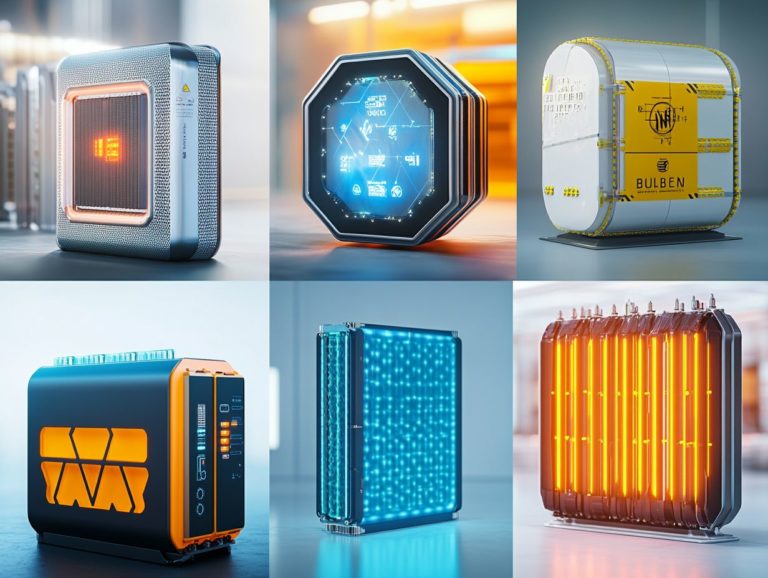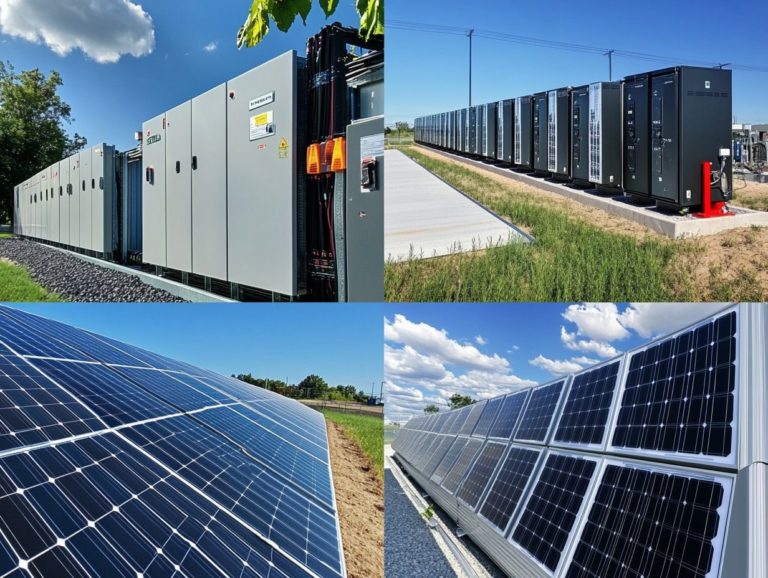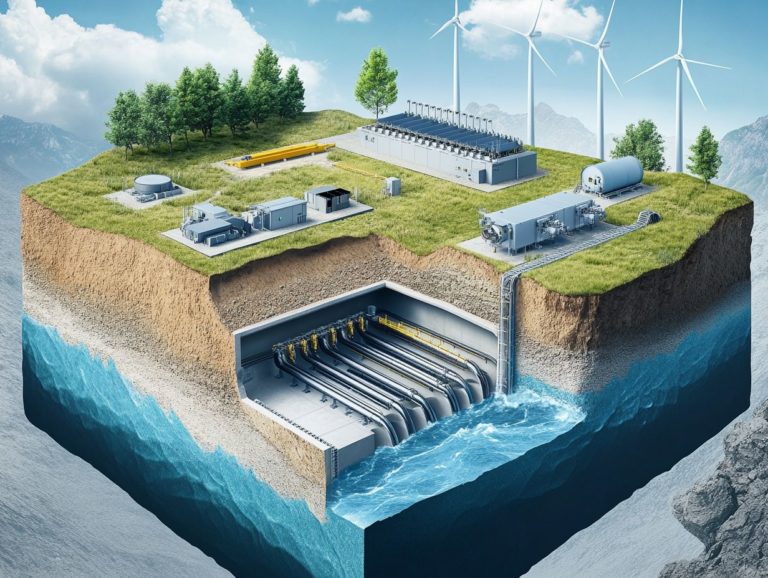The Advantages of Advanced Energy Storage Systems
In an era where your energy needs are changing, advanced energy storage systems are becoming essential for a sustainable future.
These technologies enhance the efficiency of renewable sources like solar and wind, providing reliability in ever-fluctuating energy markets.
Get ready to explore exciting energy storage solutions that are changing the game! This article showcases various energy storage options such as batteries, flywheels, and hydrogen fuel cells along with their advantages and real-world applications.
Discover how these systems are revolutionizing energy consumption and paving the way for a greener planet.
Contents
- Key Takeaways:
- The Importance of Energy Storage Systems
- Types of Advanced Energy Storage Systems
- Why Choose Advanced Energy Storage Systems?
- Applications of Advanced Energy Storage Systems
- Renewable Energy Integration
- Electric Vehicles
- Microgrids and Off-Grid Systems
- Frequently Asked Questions
- What are advanced energy storage systems and why are they important?
- What are the advantages of using advanced energy storage systems?
- How do advanced energy storage systems improve energy efficiency?
- What cost savings can be achieved by utilizing advanced energy storage systems?
- How do advanced energy storage systems contribute to a more reliable and resilient energy supply?
- Are there any environmental benefits to using advanced energy storage systems?
Key Takeaways:
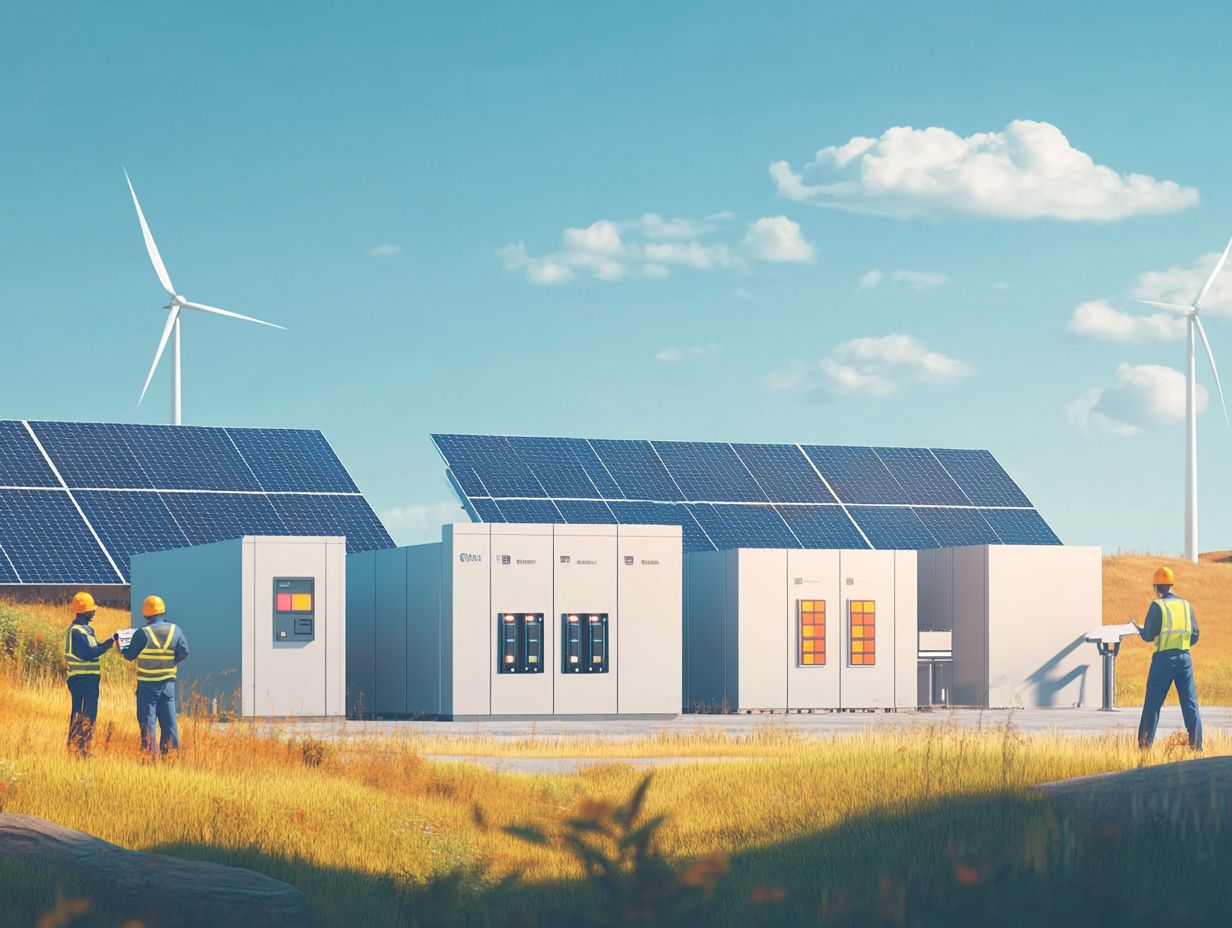
- Advanced energy storage systems store energy efficiently and cut costs.
- They ensure a stable energy supply, even during outages.
- These systems help reduce carbon emissions and boost renewable energy use.
The Importance of Energy Storage Systems
Energy Storage Systems (ESS) hold a vital position in today s energy landscape, serving as the essential link that fosters the seamless integration of Renewable Energy Sources into the grid. They play a key role in maintaining grid reliability, especially during peak demand periods.
As you navigate the shift towards a more sustainable energy future, the importance of ESS becomes increasingly clear. They address challenges like the inconsistent supply of renewable energy and the growing demand for energy capacity, ensuring that you can meet the consumption needs of tomorrow.
Understanding the Role of Energy Storage
Energy Storage Systems offer numerous benefits, from providing backup power during outages to enabling cost-saving strategies that optimize supply and demand.
These systems are essential for facilitating demand response programs. They allow you to adjust your electricity use during peak times, reducing strain on the grid. By better managing renewable resources like solar and wind, energy storage significantly enhances the efficiency of energy operations. This vital function alleviates fluctuations in energy supply and contributes to a more reliable power grid.
As a result, integrating storage solutions can lead to significant cost savings for both utilities and consumers, highlighting their crucial role in modern grid management.
Types of Advanced Energy Storage Systems
Advanced Energy Storage Systems encompass a variety of sophisticated technologies, including Battery Energy Storage Systems (BESS), which use advanced batteries like Lithium-ion batteries. You’ll also find options like Flywheels, Hydrogen Fuel Cells, and Thermal Energy Storage, each presenting unique advantages and capabilities tailored to diverse energy needs.
Batteries
Battery Energy Storage Systems, especially those using Lithium-ion technology, are leading the way in energy storage solutions for applications such as electric vehicle charging.
These systems utilize cutting-edge advancements to achieve impressive efficiency levels, making them highly desirable for both residential and commercial use.
It s also important to consider other types of batteries, like lead-acid and nickel-cadmium, as well as emerging solid-state variations. Each alternative offers unique benefits in terms of sustainability and cost-effectiveness.
For example, while Lithium-ion batteries have high energy density, lead-acid batteries may be the more economical choice for certain applications, despite a shorter lifespan. Meanwhile, innovative technologies are paving the way for improved recycling practices and safer materials, ultimately enhancing the environmental impact of battery storage systems.
Discover how you can benefit from advanced energy storage today!
Flywheels
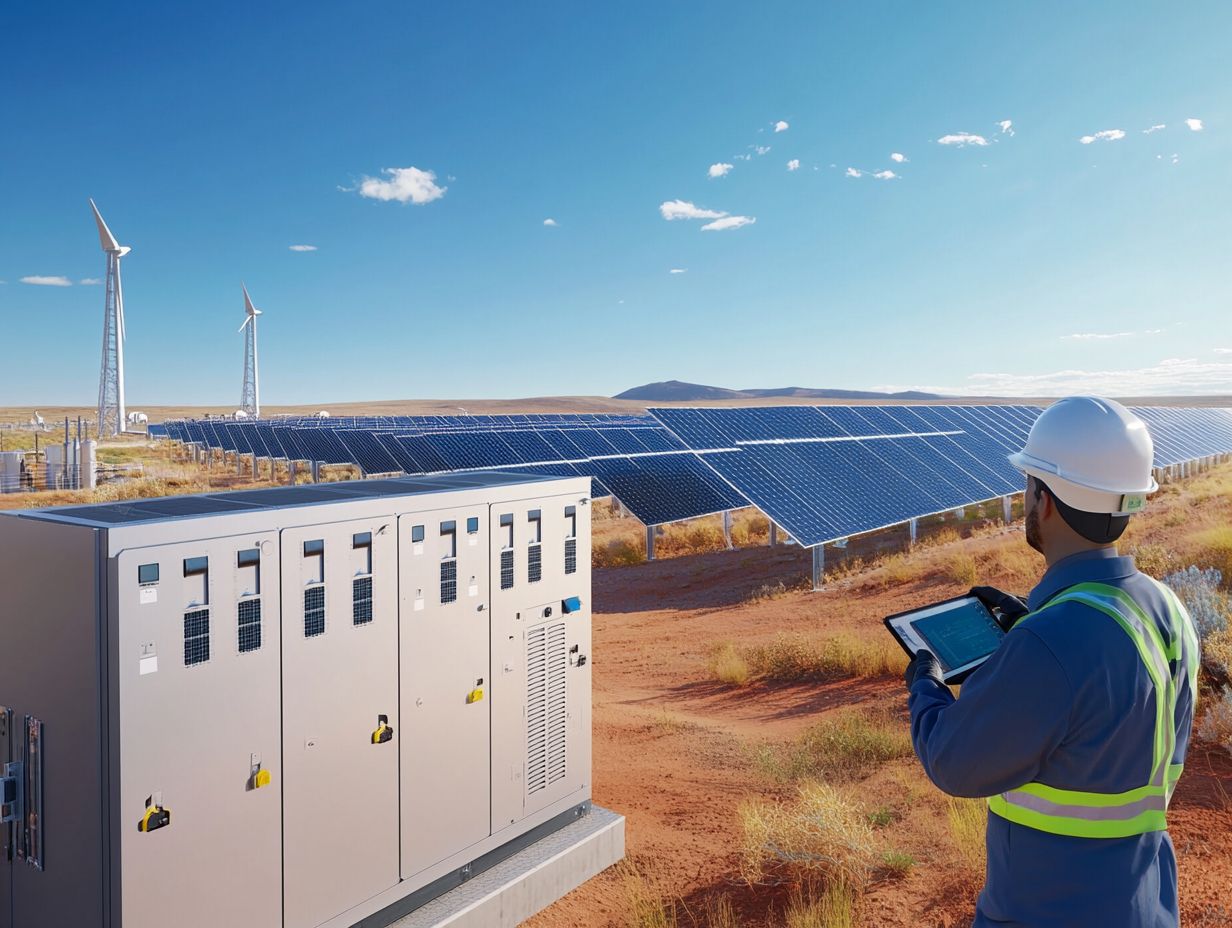
Flywheels are advanced machines. They store energy in spinning motion, providing quick responses and great energy capacity.
By using the principles of angular momentum, these systems swiftly absorb and release energy. This acts as an effective buffer against fluctuations in power generation and consumption.
Unlike traditional battery technologies, flywheels have a notably longer lifespan. They can endure countless charge and discharge cycles without losing efficiency, greatly enhancing their reliability.
This durability makes them ideal for applications like grid stabilization, where maintaining a consistent frequency is vital for infrastructure integrity. Their compact design allows for easy integration into various energy systems, including renewable sources like wind and solar. This amplifies their value in the shift toward sustainable energy solutions.
Hydrogen Fuel Cells
Hydrogen fuel cells turn hydrogen into electricity. This clean option is great for backup power with little impact on the environment.
This advanced technology operates through a chemical process that creates electricity while producing only water and heat as by-products. Their versatility makes them perfect for various industries, especially transportation, where they power vehicles and reduce reliance on fossil fuels.
In manufacturing, hydrogen fuel cells act as a reliable energy source. They help companies meet their sustainability goals. Integrating these systems boosts operational efficiency and plays a vital role in reducing carbon emissions.
As a result, hydrogen fuel cells are seen as vital players in the transition toward a greener economy.
Thermal Energy Storage
Thermal Energy Storage allows you to harness excess thermal energy for future use. It plays a key role in renewable energy integration and microgrid support.
This technology captures surplus heat from sources like solar thermal systems or industrial processes. It stores this heat in mediums like molten salts or water.
When energy demand increases or renewable generation dips, you can release that stored thermal energy to maintain a stable supply.
By enhancing grid flexibility, thermal energy storage is essential for balancing the intermittent nature of renewable resources. This reduces reliance on conventional energy sources during peak demand.
This technology boosts energy efficiency and aligns with sustainability goals. It positions itself as a key player in the transition to a greener energy future.
Why Choose Advanced Energy Storage Systems?
Advanced Energy Storage Systems offer numerous advantages. They enhance the efficiency of your energy resources while leading to substantial cost savings.
You can expect a more reliable power supply along with various environmental benefits. These benefits are crucial for fostering a sustainable energy future.
Efficiency and Cost Savings
Advanced Energy Storage Systems significantly enhance the efficiency of your energy resources. They also contribute to cost savings by minimizing operational expenses and optimizing energy capacity management.
These systems balance supply and demand, especially during peak usage. This can directly influence the financial performance of your energy facilities.
By fine-tuning load management, they help you respond quickly to market fluctuations and energy price signals.
Integrating energy storage with renewable sources like solar and wind not only boosts power supply reliability but also reduces reliance on fossil fuels. This helps you align your operations with green energy initiatives, achieving a lower carbon footprint and unlocking potential incentives. All of this enhances your sustainability objectives.
Reliability and Resilience
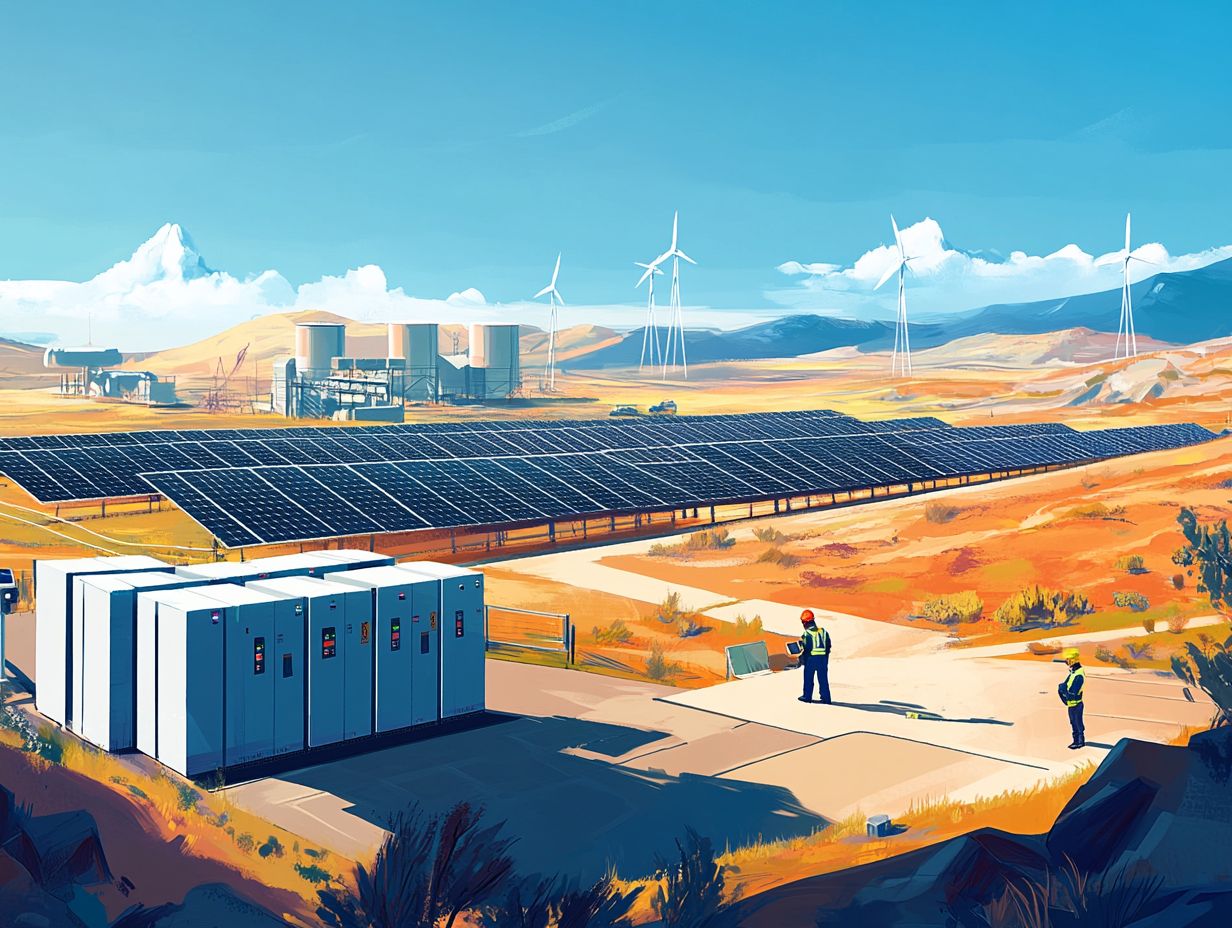
The reliability and resilience of your energy supply systems are significantly enhanced by Advanced Energy Storage Systems, which offer essential backup power and support you during peak demand.
These innovative solutions play a crucial role in stabilizing the grid by storing excess energy produced during low-demand periods. This enables you to harness that energy when demand surges or outages occur.
When unexpected events disrupt your regular power supply, energy storage systems swiftly dispatch stored energy. This ensures continuous service to your home or business.
By effectively managing peak loads, these systems relieve strain on the grid and contribute to more efficient and sustainable energy usage. Ultimately, they aid in the transition to cleaner energy sources. Their role is crucial and can t be overlooked!
Environmental Benefits
Advanced Energy Storage Systems play a pivotal role in reducing your environmental impact. They seamlessly integrate renewable energy sources and promote sustainable energy consumption practices.
These systems function as essential buffers, capturing excess energy generated during peak renewable production think sunny afternoons or breezy nights. This ensures you have a reliable energy supply even when generation dips.
By bolstering grid reliability, these systems lessen your reliance on fossil fuel-based power plants, major culprits of carbon emissions. Incorporating energy storage technologies into your energy ecosystem actively facilitates the shift toward cleaner alternatives.
This enables cities and communities to transition smoothly to low-carbon futures. This transition aligns perfectly with global sustainability goals, fostering cleaner air, healthier environments, and a more resilient energy infrastructure for everyone.
Applications of Advanced Energy Storage Systems
Advanced Energy Storage Systems offer a wide range of applications. These include renewable energy integration, electric vehicle charging, and microgrid support.
By leveraging these systems, you contribute to a more flexible and resilient energy landscape. This enhances sustainability and efficiency in your energy usage while allowing for energy arbitrage, which is buying energy at a lower cost and selling it when prices rise.
Renewable Energy Integration
Integrating renewable energy into your existing power grid becomes significantly more manageable with advanced energy storage systems. These enhance grid reliability and provide essential frequency control, addressing issues of demand response.
These technologies are vital in tackling the intermittent nature of renewable sources like solar and wind. They can fluctuate dramatically throughout the day due to changing weather conditions.
By storing the excess energy generated during peak production times, you ensure that this energy can be released during periods of high demand or low generation. This effectively smooths out those fluctuations.
This approach stabilizes your grid and optimizes the use of clean energy, reducing your reliance on fossil fuels. Incorporating energy storage enables you to provide additional services like voltage regulation and spinning reserves.
Ultimately, this makes your energy supply more resilient and sustainable.
Electric Vehicles
Electric Vehicles (EVs) depend significantly on a robust charging infrastructure. Here, Battery Energy Storage plays a pivotal role in ensuring a steady energy supply and effectively managing peak demand.
As you embrace the rise of electric vehicles, the synergy between EVs and cutting-edge battery technologies becomes essential. This relationship enhances the reliability of charging stations and fortifies grid stability.
With strategic energy storage solutions in place, these chargers can handle peak demand without straining the grid. This results in smoother energy distribution and improved operational costs.
Innovative battery systems are being crafted not just to power your vehicles but also to enable the seamless integration of renewable energy sources. This marks a groundbreaking step in sustainability, offering you a smooth and efficient experience along the way, especially as we look toward the future of energy storage.
Microgrids and Off-Grid Systems
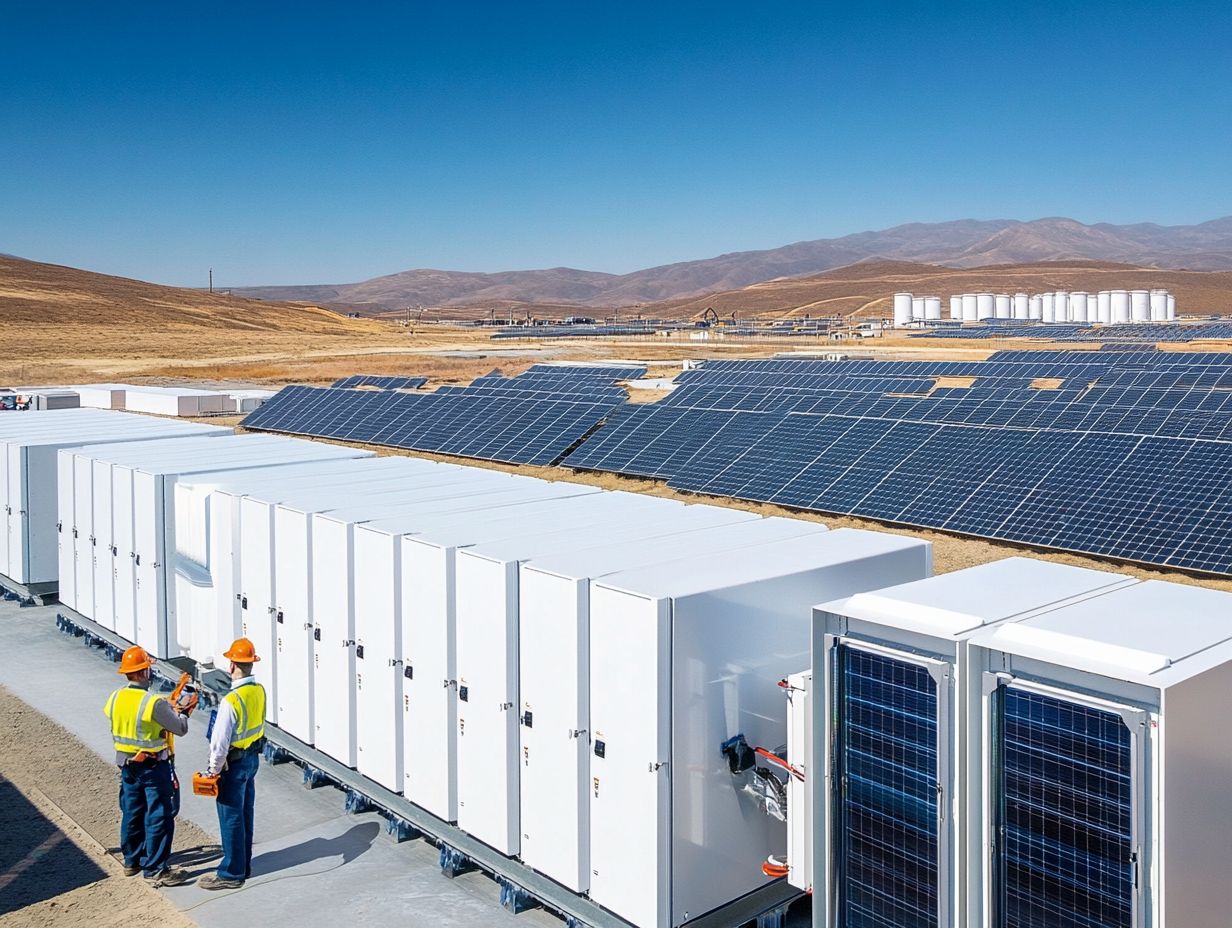
Microgrids and off-grid systems harness advanced energy storage systems to deliver reliable backup power and enhance energy resilience in remote and underserved areas.
These groundbreaking solutions are essential for a brighter energy future, meeting the changing energy supply and steady demand. By effectively storing renewable energy from sources like solar and wind, the benefits of home energy management systems optimize energy usage. This ensures you have access to power even during outages or adverse weather conditions.
The integration of strong energy storage solutions supports local economies and contributes to sustainability efforts by promoting lower carbon footprints. When energy storage is deployed within microgrids, it enables communities like yours to thrive independently and adapt to the ever-evolving energy landscape.
Frequently Asked Questions
Have questions about advanced energy storage systems? Here are some common inquiries answered!
What are advanced energy storage systems and why are they important?
Advanced energy storage systems store energy for later use, making them key for renewable energy integration and grid stabilization.
What are the advantages of using advanced energy storage systems?
Using advanced energy storage systems offers several advantages, including increased efficiency, cost savings, and a more reliable energy supply.
How do advanced energy storage systems improve energy efficiency?
These systems store excess energy generated during low demand and release it during peak demand, reducing waste and increasing overall efficiency.
What cost savings can be achieved by utilizing advanced energy storage systems?
They can reduce costs by avoiding expensive upgrades to the power grid, decreasing the need for peak power plants, and providing energy during high-demand periods.
How do advanced energy storage systems contribute to a more reliable and resilient energy supply?
By offering backup energy during outages or high demand, these systems help prevent blackouts and improve overall energy supply reliability.
Are there any environmental benefits to using advanced energy storage systems?
Yes, they reduce carbon emissions by allowing for increased use of renewable energy sources and decreasing reliance on fossil fuel power plants.
Discover how adopting advanced energy storage systems can transform your community today!


